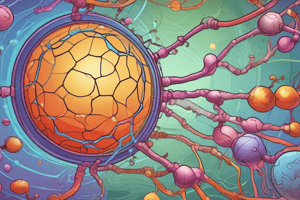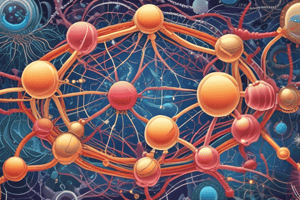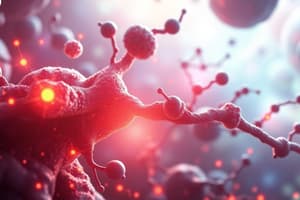Podcast
Questions and Answers
What is the role of Fo rotation in ATP synthase?
What is the role of Fo rotation in ATP synthase?
- To cause conformational changes in the F1 domain (correct)
- To bind ADP + Pi
- To create a proton gradient
- To pump protons into the mitochondrial matrix
What is the effect of oligomycin on ATP synthase?
What is the effect of oligomycin on ATP synthase?
- It closes the H+ channel (correct)
- It increases electron transport
- It phosphorylates ADP to ATP
- It enhances the proton gradient
What is the result of the pH and electrical gradients not being dissipated?
What is the result of the pH and electrical gradients not being dissipated?
- Electron transport continues
- Electron transport stops (correct)
- ATP synthesis increases
- Proton pumping becomes easier
What is the term for the dependence of cellular respiration on the ability to phosphorylate ADP to ATP?
What is the term for the dependence of cellular respiration on the ability to phosphorylate ADP to ATP?
Where does the electron transport chain take place?
Where does the electron transport chain take place?
What is the purpose of the proton gradient in ATP synthase?
What is the purpose of the proton gradient in ATP synthase?
What is the direction of proton movement in the mitochondrial inner membrane?
What is the direction of proton movement in the mitochondrial inner membrane?
What is the result of the binding of ADP + Pi to ATP synthase?
What is the result of the binding of ADP + Pi to ATP synthase?
What is the result of inhibition of electron transport on phosphorylation?
What is the result of inhibition of electron transport on phosphorylation?
What is the function of uncoupling proteins (UCPs) in the mitochondrial membrane?
What is the function of uncoupling proteins (UCPs) in the mitochondrial membrane?
What is the result of decreased availability of ADP or Pi?
What is the result of decreased availability of ADP or Pi?
What is the role of UCP1 in mammals?
What is the role of UCP1 in mammals?
What is the effect of 2,4-dinitrophenol on electron transport and phosphorylation?
What is the effect of 2,4-dinitrophenol on electron transport and phosphorylation?
What is the term for the process of generating heat in brown adipocytes?
What is the term for the process of generating heat in brown adipocytes?
What activates UCP1 in mammals?
What activates UCP1 in mammals?
What is the location of uncoupling proteins (UCPs) in mammals?
What is the location of uncoupling proteins (UCPs) in mammals?
In humans, which of the following uncoupling proteins is most likely to play a significant role in energy balance?
In humans, which of the following uncoupling proteins is most likely to play a significant role in energy balance?
What is the electron carrier molecule involved in the electron transport chain?
What is the electron carrier molecule involved in the electron transport chain?
Where does the process of thermogenesis occur in response to cold in the neonate?
Where does the process of thermogenesis occur in response to cold in the neonate?
In which cellular compartment is the electron transport chain primarily located?
In which cellular compartment is the electron transport chain primarily located?
What is the byproduct of the electron transport chain that drives ATP synthesis?
What is the byproduct of the electron transport chain that drives ATP synthesis?
What is the primary function of brown fat in response to cold in the neonate?
What is the primary function of brown fat in response to cold in the neonate?
Flashcards are hidden until you start studying
Study Notes
ATP Synthase
- Fo rotation causes conformational changes in the F1 domain, allowing it to bind ADP + Pi, phosphorylate ADP to ATP, and release ATP
Oligomycin
- Oligomycin binds to the Fo domain of ATP synthase, closing the H+ channel
- This prevents reentry of protons into the mitochondrial matrix and phosphorylation of ADP to ATP
- As a result, electron transport stops due to the difficulty of pumping protons against steep gradients
Respiratory Control
- Cellular respiration depends on the ability to phosphorylate ADP to ATP
- This is known as respiratory control, which is the consequence of the tight coupling of electron transport and phosphorylation
- Inhibition of one process inhibits the other, and also results from decreased availability of ADP or Pi
Uncoupling Proteins (UCP)
- UCPs occur in the inner mitochondrial membrane of mammals, including humans
- They create a "proton leak," allowing protons to re-enter the mitochondrial matrix without energy being captured as ATP
- The energy is released as heat, and the process is called nonshivering thermogenesis
UCP1 (Thermogenin)
- UCP1 is responsible for heat production in brown adipocytes of mammals
- It is activated by fatty acids and uses almost 90% of respiratory energy for thermogenesis in response to cold in neonates and during arousal in hibernating animals
Studying That Suits You
Use AI to generate personalized quizzes and flashcards to suit your learning preferences.




